How can I help you?
Snapping in WPF Diagram (SfDiagram)
16 Jun 20257 minutes to read
When you draw, resize, or move a diagramming element in the page, you can set it, so that it will align or snap to the nearest intersection in the page even when the grid is visible or not. However, you can control the alignment and snap-to capabilities of elements by using the snapping option of SfDiagram.
The SnapSettings class and its properties allows you to snap the shapes to the ruler subdivisions more easily.
Refer to the SnapSettings properties.
Snap-to-objects
The snap-to-object provides visual cues to assist with aligning and spacing diagram. A node or group can be snapped with its neighboring objects based on certain alignments (same size and same position). Such alignments are visually represented as smart guide lines, which are in cyan shade color and its color code is #83F6F0.
Refer to the members of SnapToObject.
Snapping to objects can be enabled by assigning values to the SnapToObject property of SnapSettings class. Default value is None.
<!--Initialize SfDiagram-->
<syncfusion:SfDiagram x:Name="diagram">
<!--Enables the SnapToObject value as All -->
<syncfusion:SfDiagram.SnapSettings>
<syncfusion:SnapSettings SnapToObject="All"/>
</syncfusion:SfDiagram.SnapSettings>
</syncfusion:SfDiagram>//Initialize SfDiagram
SfDiagram diagram = new SfDiagram();
//Enables the SnapToObject value as All
diagram.SnapSettings.SnapToObject = SnapToObject.All;| Enum | Value | Output |
|---|---|---|
| SnapToObject | All | 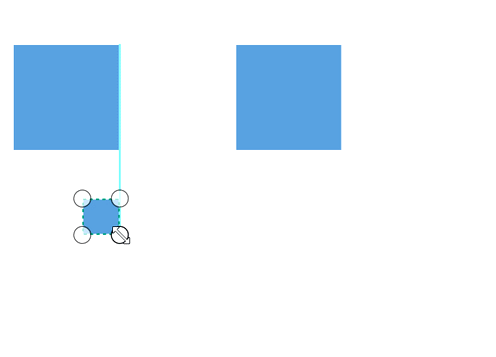 |
| Bottom |
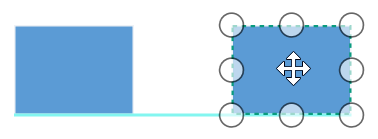 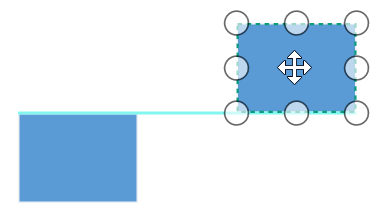
|
|
| BottomBottom |  |
|
| BottomTop |  |
|
| Height | 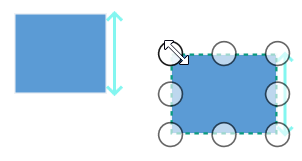 |
|
| HorizontalCenter | 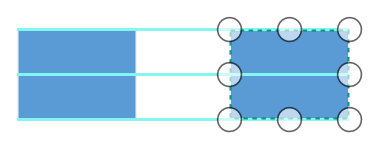 |
|
| HorizontalSpacing |  |
|
| Left |
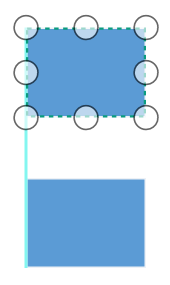 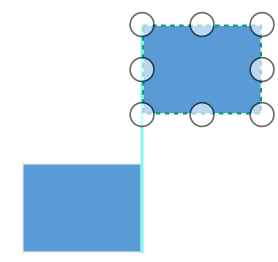
|
|
| LeftLeft |  |
|
| LeftRight |  |
|
| None | 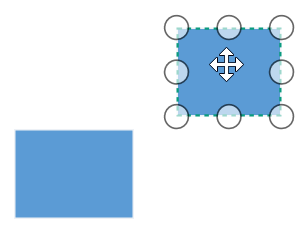 |
|
| Port | 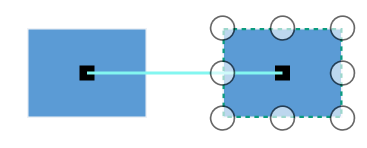 |
|
| Right |
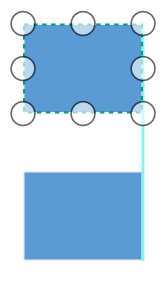 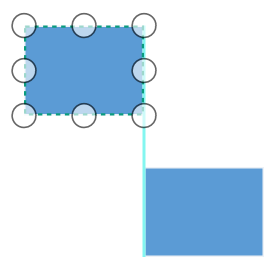
|
|
| RightRight |  |
|
| RightLeft |  |
|
| Segment |
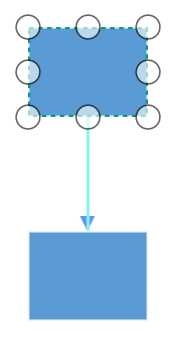 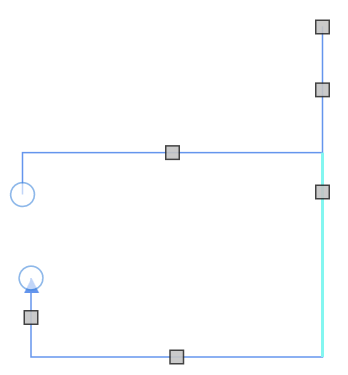
|
|
| Size | 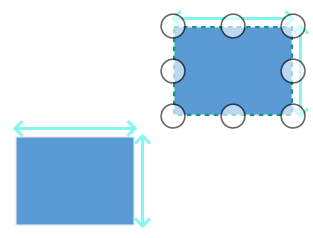 |
|
| Top |
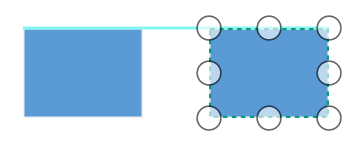 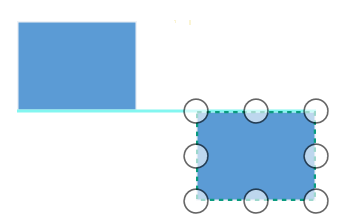
|
|
| TopTop |  |
|
| TopBottom |  |
|
| VerticalCenter | 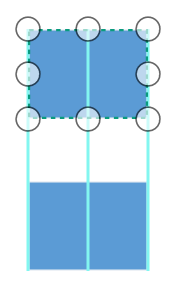 |
|
| VerticalSpacing | 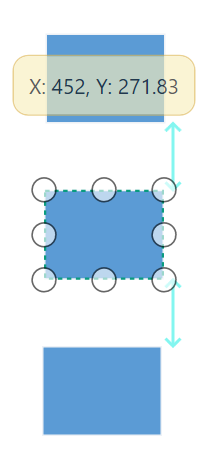 |
|
| Width | 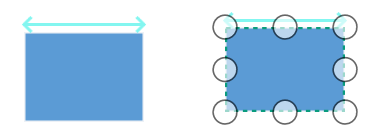 |
How to change the snap indication style
When snapping, cyan shade color indication lines will be shown. These indication lines styles can be customized by using the SnapIndicatorStyle property of SnapSettings class.
<!--Custom style for snap indicator-->
<Style TargetType="Shape" x:Key="snapIndicatorStyle">
<Setter Property="Stroke" Value="Red"/>
<Setter Property="StrokeDashArray" Value="3"/>
</Style>
<!--Initialize SfDiagram-->
<syncfusion:SfDiagram x:Name="diagram">
<!--Specify the snap indicator style -->
<syncfusion:SfDiagram.SnapSettings>
<syncfusion:SnapSettings SnapToObject="All"
SnapIndicatorStyle="{StaticResource snapIndicatorStyle}" />
</syncfusion:SfDiagram.SnapSettings>
</syncfusion:SfDiagram>//Initialize SfDiagram
SfDiagram diagram = new SfDiagram();
//Custom style for Snap indicator
Style pathStyle = new Style(typeof(Shape));
pathStyle.Setters.Add(new Setter(Shape.StrokeProperty, new SolidColorBrush(Colors.Red)));
pathStyle.Setters.Add(new Setter(Shape.StrokeDashArrayProperty, new DoubleCollection() { 3, 3 }));
diagram.SnapSettings = new SnapSettings()
{
//SnapConstraints = SnapConstraints.SnapToLines ,
SnapToObject = SnapToObject.All,
//Specifies custom snap indicator style
SnapIndicatorStyle = pathStyle as Style,
};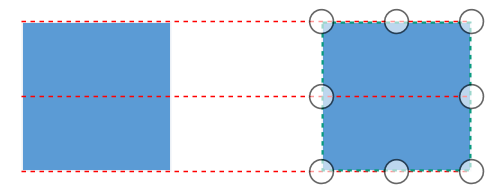
Snap to Lines
This feature allows the diagram objects to snap to the nearest interaction of gridlines while being dragged or resized. This feature enables easier alignment during layout or design.
Snapping to gridlines can be enabled or disabled with the SnapConstraints property of SnapSettings. Default value is None.
<!--Initialize SfDiagram-->
<syncfusion:SfDiagram x:Name="diagram">
<!--Enables the SnapConstraints value as SnapToLines -->
<syncfusion:SfDiagram.SnapSettings>
<syncfusion:SnapSettings SnapConstraints="SnapToLines,ShowLines"/>
</syncfusion:SfDiagram.SnapSettings>
</syncfusion:SfDiagram>//Initialize SfDiagram
SfDiagram diagram = new SfDiagram();
//Enables the SnapConstraints value as SnapToLines
diagram.SnapSettings.SnapConstraints = SnapConstraints.ShowLines | SnapConstraints.SnapToLines;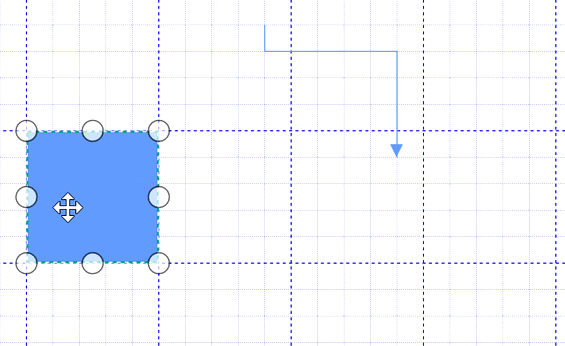
Snapping on dock ports
Diagram allows snapping on dock ports while making new connection on it and dragging connection over dock ports.
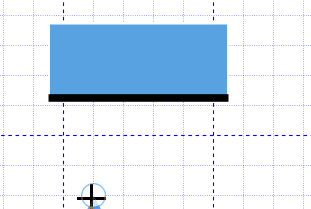
Find the Snapping sample to depict the Snapping.
See Also
How to enable snapping in diagram?
How to enable the snapping lines only for nodes in the WPF Diagram (SfDiagram)?